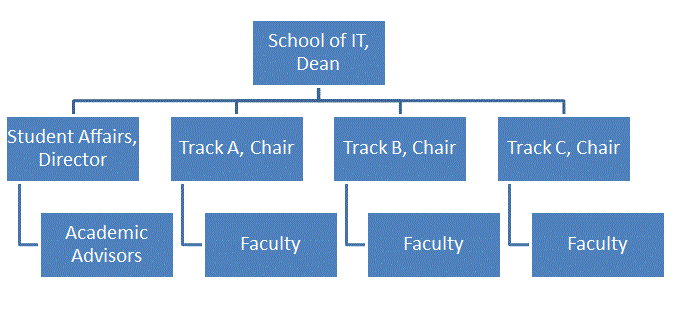The Organization
The university’s online IT school offers undergraduate degrees in a wide range of IT subjects along with certificates in common platforms such as Oracle, Microsoft, Linux, and Cisco. The school is career focused and students can choose from a variety of career paths including web development, networking, database administration, mobile application development, computer forensics, and security. Undergraduate enrollment is on a rolling basis over three overlapping tracks (A, B, C), meaning students can enroll and start pretty much at any time throughout the year. An average of approximately 2,000 students is enrolled in any given track. The school has more than 15 full-time faculty members and about 175 adjuncts.
The Stakeholders
The stakeholders in the decision making process include the dean of the school who oversees the academic department chairs and the student affairs director. The chairs oversee the faculty while the director oversees the academic advisors. While the dean, chairs, and director generally do not directly participate in the process, they have the authority to do so and can issue directives that influence the process.
Organizational Chart
Personnel involved with making decisions regarding undergraduate student retention and intervention in the School of IT are organized as shown in Figure For clarity, administrators who support the decision making process but have no influence on the outcome are omitted.

It should be noted that the school was originally organized by traditional subject domain with each chair credentialed in his or her respective domain. Departmentalizing by track occurred several years ago so chairs could more effectively monitor student progress which was previously a challenge. In addition, faculty are not permitted to teach in more than one track, thus each track has its own pool of adjuncts.
Organizational Culture
The culture of the School of IT reflects that of its parent university which from its perspective is “We're about discovery, invention and results. Kaplan is for people who like to win. We encourage employees to push themselves to new heights and fully leverage their talents” (Kaplan, n.d.). Translated to an adjunct’s perspective, it likely means “do more for less” or “do more with less.” Despite the incongruence of the perspectives, the school’s entrepreneurial desire to win drives its leadership and in turn, drives its faculty to find ways to work smarter. In addition, it is generally well known, at least among academics that those who teach do so more out of passion than for the paycheck, thus they are more willing to tolerate ever-increasing workloads that require them to do more than just teach.
Influence of Power and Politics
Power and politics are strong influences in the environment and on the decision making process. Recent legislation that place greater restrictions on student financial aid eligibility and impose greater accountability on the institution for student loan defaults and attrition has resulted in declining enrollments. Consequently, the institution has cut budgets and downsized leaving the remaining adjuncts competing for a limited number of course assignments.
